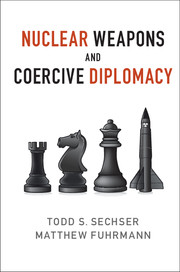Book contents
- Frontmatter
- Dedication
- Contents
- List of Tables
- List of Figures
- Acknowledgements
- Part I The Logic of Nuclear Skepticism
- Part II Trends
- Part III Cases
- Roadmap for Part III
- 5 Brinkmanship Busts: When Nuclear Coercion Fails
- 6 Think Again: Reassessing Nuclear Victories
- Part IV Conclusions
- Appendix: Methods and Data
- References
- Index
Roadmap for Part III
from Part III - Cases
Published online by Cambridge University Press: 16 February 2017
- Frontmatter
- Dedication
- Contents
- List of Tables
- List of Figures
- Acknowledgements
- Part I The Logic of Nuclear Skepticism
- Part II Trends
- Part III Cases
- Roadmap for Part III
- 5 Brinkmanship Busts: When Nuclear Coercion Fails
- 6 Think Again: Reassessing Nuclear Victories
- Part IV Conclusions
- Appendix: Methods and Data
- References
- Index
Summary
The evidence offered in Part II of the book is an important pillar of support for nuclear skepticism theory. We demonstrated that nuclear states do not issue more successful compellent threats (Chapter 3) or obtain more favorable territorial dispute settlements (Chapter 4) than their nonnuclear counterparts, on average. Most of the time, then, nuclear weapons do not appear to provide countries with special benefits when it comes to coercion in world politics. However, the preceding analysis leaves an important question unanswered: does nuclear coercion work when states deliberately invoke their arsenals in crises?
In many of the cases that we analyzed in the previous two chapters, countries did not consciously use their nuclear arsenals for coercive purposes. Indeed, nuclear threats were notably absent from the majority of coercive threats and territorial disputes that we studied. We are not surprised that countries rarely brandish their nuclear arsenals, since our theory expects explicit brinkmanship behavior to occur infrequently. Yet a critic might argue that cases in which the danger of nuclear war was exceedingly low, like the 1999 Kosovo War, tell us little about the utility of nuclear weapons. Nuclear weapons would not play a role in these crises, according to this view, since states made no attempt to engage in atomic blackmail.
In the next two chapters, we address this concern by studying cases in which countries clearly attempted nuclear coercion. Instead of comparing the success rates of nuclear and nonnuclear states in coercive diplomacy, as we did in Chapters 3 and 4, the following chapters analyze whether nuclear brinkmanship works when it is tried.
A crisis must meet three conditions to be included in our analysis. First, at least one crisis participant must issue an explicit or implicit nuclear threat. This can be done by threatening to use nuclear weapons, alerting nuclear forces, deploying atomic weapons, or conducting tests of either nuclear weapons or ballistic missiles. However, these actions alone do not necessarily make a dispute a serious nuclear crisis. Some nuclear threats certainly bring states to the brink of nuclear war, but others do not.
- Type
- Chapter
- Information
- Nuclear Weapons and Coercive Diplomacy , pp. 125 - 131Publisher: Cambridge University PressPrint publication year: 2017

